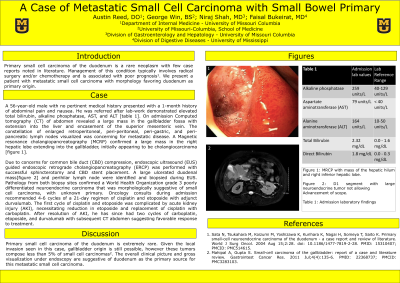Tuesday Poster Session
Category: Small Intestine
P4165 - A Case of Metastatic Small Cell Carcinoma With Small Bowel Primary
Tuesday, October 24, 2023
10:30 AM - 4:00 PM PT
Location: Exhibit Hall

Has Audio
- AR
Austin Reed, DO
University of Missouri-Columbia
Columbia, MO
Presenting Author(s)
Austin Reed, DO1, George Win, BS1, Niraj Shah, MD1, Faisal A.. Bukeirat, MD2
1University of Missouri-Columbia, Columbia, MO; 2University of Missouri at Columbia, Columbia, MO
Introduction: Primary small cell carcinoma of the duodenum is an incredibly rare neoplasm with few case reports noted in literature. Management of this condition typically involves radical surgery and/or chemotherapy and is associated with poor prognosis [1]. We present a patient with metastatic small cell carcinoma with morphology favoring duodenum as the primary organ.
Case Description/Methods: A 56-year-old male with no pertinent medical history presented with a 1-month history of abdominal pain and nausea. He was referred after lab-work demonstrated elevated total bilirubin, alkaline phosphatase, AST, and ALT [table 1]. On admission Computed tomography (CT) of abdomen revealed a large mass in the gallbladder fossa with extension into the liver and encasement of the superior mesenteric vein. The constellation of enlarged retroperitoneal, peri-peritoneal, peri-gastric, and peri-pancreatic lymph nodes visualized was concerning for metastatic disease. A Magnetic resonance cholangiopancreatography (MCRP) confirmed a large mass in the right hepatic lobe extending into the gallbladder, initially appearing to be cholangiocarcinoma [figure 1].
Due to concerns for common bile duct (CBD) compression, endoscopic ultrasound (EUS) guided endoscopic retrograde cholangiopancreatography (ERCP) was performed with successful sphincterotomy and CBD stent placement. A large ulcerated duodenal mass and perihilar lymph node were identified and biopsied during EUS. Pathology from both biopsy sites confirmed a World Health Organization grade 3 poorly differentiated neuroendocrine carcinoma that was morphologically suggestive of small cell carcinoma, with unknown primary. Oncology consults during admission recommended 4-6 cycles of a 21-day regimen of cisplatin and etoposide with adjunct durvalumab. The first cycle of cisplatin and etoposide was complicated by acute kidney injury (AKI), necessitating reduction in etoposide and replacement of cisplatin with carboplatin. After resolution of AKI, he has since had two cycles of carboplatin, etoposide, and durvalumab with subsequent CT abdomen suggesting favorable response to treatment
Discussion: Primary small cell carcinoma of the duodenum is extremely rare. Given the local invasion seen in this case, gallbladder origin is still possible, however these tumors compose less than 5% of small cell carcinomas [2]. The overall clinical picture and gross visualization under endoscopy are suggestive of duodenum as the primary source for this metastatic small cell carcinoma.

Disclosures:
Austin Reed, DO1, George Win, BS1, Niraj Shah, MD1, Faisal A.. Bukeirat, MD2. P4165 - A Case of Metastatic Small Cell Carcinoma With Small Bowel Primary, ACG 2023 Annual Scientific Meeting Abstracts. Vancouver, BC, Canada: American College of Gastroenterology.
1University of Missouri-Columbia, Columbia, MO; 2University of Missouri at Columbia, Columbia, MO
Introduction: Primary small cell carcinoma of the duodenum is an incredibly rare neoplasm with few case reports noted in literature. Management of this condition typically involves radical surgery and/or chemotherapy and is associated with poor prognosis [1]. We present a patient with metastatic small cell carcinoma with morphology favoring duodenum as the primary organ.
Case Description/Methods: A 56-year-old male with no pertinent medical history presented with a 1-month history of abdominal pain and nausea. He was referred after lab-work demonstrated elevated total bilirubin, alkaline phosphatase, AST, and ALT [table 1]. On admission Computed tomography (CT) of abdomen revealed a large mass in the gallbladder fossa with extension into the liver and encasement of the superior mesenteric vein. The constellation of enlarged retroperitoneal, peri-peritoneal, peri-gastric, and peri-pancreatic lymph nodes visualized was concerning for metastatic disease. A Magnetic resonance cholangiopancreatography (MCRP) confirmed a large mass in the right hepatic lobe extending into the gallbladder, initially appearing to be cholangiocarcinoma [figure 1].
Due to concerns for common bile duct (CBD) compression, endoscopic ultrasound (EUS) guided endoscopic retrograde cholangiopancreatography (ERCP) was performed with successful sphincterotomy and CBD stent placement. A large ulcerated duodenal mass and perihilar lymph node were identified and biopsied during EUS. Pathology from both biopsy sites confirmed a World Health Organization grade 3 poorly differentiated neuroendocrine carcinoma that was morphologically suggestive of small cell carcinoma, with unknown primary. Oncology consults during admission recommended 4-6 cycles of a 21-day regimen of cisplatin and etoposide with adjunct durvalumab. The first cycle of cisplatin and etoposide was complicated by acute kidney injury (AKI), necessitating reduction in etoposide and replacement of cisplatin with carboplatin. After resolution of AKI, he has since had two cycles of carboplatin, etoposide, and durvalumab with subsequent CT abdomen suggesting favorable response to treatment
Discussion: Primary small cell carcinoma of the duodenum is extremely rare. Given the local invasion seen in this case, gallbladder origin is still possible, however these tumors compose less than 5% of small cell carcinomas [2]. The overall clinical picture and gross visualization under endoscopy are suggestive of duodenum as the primary source for this metastatic small cell carcinoma.

Figure: Figure 1: MRCP with mass of the hepatic hilum and right inferior hepatic lobe.
Disclosures:
Austin Reed indicated no relevant financial relationships.
George Win indicated no relevant financial relationships.
Niraj Shah indicated no relevant financial relationships.
Faisal Bukeirat indicated no relevant financial relationships.
Austin Reed, DO1, George Win, BS1, Niraj Shah, MD1, Faisal A.. Bukeirat, MD2. P4165 - A Case of Metastatic Small Cell Carcinoma With Small Bowel Primary, ACG 2023 Annual Scientific Meeting Abstracts. Vancouver, BC, Canada: American College of Gastroenterology.
